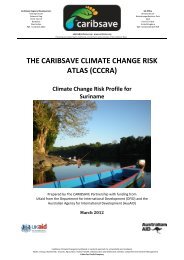Create successful ePaper yourself
Turn your PDF publications into a flip-book with our unique Google optimized e-Paper software.
oom for expansion of the fin fishery in the country <strong>and</strong> agriculture in North <strong>Caicos</strong> as long as the necessary<br />
infrastructure is put in place. Government employment is especially important to Gr<strong>and</strong> Turk, the seat of<br />
administration. Since the size of the public sector is determined by growth in revenues collected from the<br />
private sector, employment opportunities in Gr<strong>and</strong> Turk are to some extent reliant on growth in<br />
Providenciales (Kairi Consultants Limited, 2000a).<br />
The CPA surveys were carried out in first half of 1999 <strong>and</strong> the Survey of Living Conditions revealed that 26%<br />
of all individuals in TCI were poor <strong>and</strong> 3.2% were indigent. Therefore almost all individuals in the country<br />
are able to satisfy their basic nutritional requirements. Providenciales was the only isl<strong>and</strong> that had fewer<br />
poor per capita (only 15.3% of the isl<strong>and</strong> population was poor), thereby explaining the continuing exodus to<br />
the isl<strong>and</strong>. At the time Haitians made up 30% of the population, but 38% of those living under the poverty<br />
line. Haitians have filled unskilled positions <strong>and</strong> expatriates have filled higher level positions leaving<br />
Isl<strong>and</strong>ers marginalized between the two groups (Kairi Consultants Limited, 2000a). The latest Development<br />
Framework has placed the empowerment of TC Isl<strong>and</strong>ers very much at the forefront:<br />
TCIsl<strong>and</strong>ers must remain first as the subject of all development, <strong>and</strong> cease being incidental. Their<br />
goals, their needs <strong>and</strong> the benefits to themselves, <strong>and</strong> the generations following, now comm<strong>and</strong><br />
primacy of place. (Source: Government of the <strong>Turks</strong> <strong>and</strong> <strong>Caicos</strong> Isl<strong>and</strong>s, 2008)<br />
The gap between rich <strong>and</strong> poor is seen in construction costs where typically the higher the per capita GDP,<br />
the higher the construction cost <strong>and</strong> therefore the greater the value on completion. In <strong>Turks</strong> <strong>and</strong> <strong>Caicos</strong>,<br />
per capita GDP is the lowest <strong>and</strong> construction costs are amongst the highest suggesting that a high income<br />
minority is involved in the development <strong>and</strong> subsequent sale of property (BCQS International, 2010). There<br />
is also a general perception that the banking system is not supportive of the TC Isl<strong>and</strong>er business person<br />
<strong>and</strong> it is alleged that it is far easier for someone from the North Atlantic to secure financing than locals. The<br />
result is “that the growth of the economy has not produced an equitable share in the benefits between<br />
foreign <strong>and</strong> domestic business. The large number of instances cited suggests that these are not mere<br />
anecdotes. Even if the perception were false, it exists nevertheless” (Kairi Consultants Limited, 2000a).<br />
2.3. Importance of tourism to the national economy<br />
Caribbean tourism is based on the natural environment, <strong>and</strong> the region’s countries are known primarily as<br />
beach destinations. The tourism product therefore depends on favourable weather conditions as well as on<br />
an attractive <strong>and</strong> healthy natural environment, particularly in the coastal zone. Both of these are<br />
threatened by climate change. The Caribbean is the most tourism-dependent region in the world with few<br />
options to develop alternative economic sectors <strong>and</strong> is one of the most vulnerable regions in the world to<br />
the impacts of climate change including sea level rise, coastal erosion, flooding, biodiversity loss <strong>and</strong><br />
impacts on human health.<br />
The development of tourism began in 1967 when the Executive Council agreed to lease 4,000 acres in<br />
Providenciales to Provident Ltd, with the option to outright purchase, on the completion of certain<br />
development projects (Kairi Consultants Limited, 2000a). Section 2.2 has already shown that hotels <strong>and</strong><br />
restaurants alone have contributed close to 30% of GDP in the period 2000-2007 <strong>and</strong> are responsible for<br />
21% of employment in 2007. The contribution of tourism as a whole was reported to be between 29 <strong>and</strong><br />
40% of GDP between 1995 <strong>and</strong> 2005 (CDB, 2006). With no income tax or property tax the 9%<br />
accommodation tax in hotels <strong>and</strong> guesthouses makes a significant contribution to Government Revenue<br />
with some of the proceeds (1%) earmarked for the National Trust <strong>and</strong> the Management of the National<br />
Parks (Kairi Consultants Limited, 2000a).<br />
11





